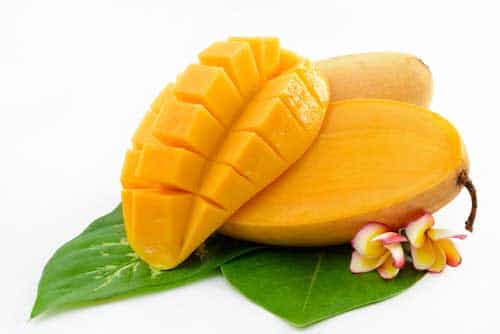One in three American adults has high blood pressure. And millions of us take drugs for it.1
But blood pressure medications often don’t work well. And they can have nasty side effects. They include headaches, nausea, fatigue, and sexual problems in men.2
And studies show they are dangerous in other ways. They increase your risk for pancreatic and skin cancers.3 4 5
Now a new research shows that one tropical fruit safely and effectively lowers high blood pressure.
Scientists from the University of California in the Davis Department of Nutrition took a close look at how eating mangoes affected 24 postmenopausal women.
They ate two cups of fresh mango every day for 14 days. Scientists closely tracked the subjects heart rate, blood pressure, blood chemistry, and breathing.
The participants’ systolic blood pressure was considerably lower two hours after they ate mangoes. Systolic pressure is the upper number in blood pressure readings.
Subjects also had lower pulse pressure. It’s the difference between the systolic and diastolic (the lower number) readings. Lower pulse pressure is a sign of good heart health.6
There were also indications that mangoes improved gut health. The breath of some subjects contained less methane gas after eating the fruit. This is a sign of healthier microbiome, researchers said.
Polyphenol Power Eases Hypertension
Mangoes contain a highly concentrated mix of beneficial polyphenols. These bioactive compounds include quercetin, gallic acid, mangiferin, and gallotannins.
Researchers believe these polyphenols are the active ingredients in mangoes that lead to lower blood pressure.
Dr. Robert Hackman led the study. He’s a research nutritionist with the UC Davis Department of Nutrition. He recently presented the results at the American Society for Nutrition’s annual meeting in Boston.
“This is the first study to demonstrate positive vascular effects of mango intake in humans,” he said.
While the study tested mangoes in postmenopausal women, there’s no reason to believe the effects would not be the same in men, researchers said.
To reap the benefits of mangoes, eat the equivalent of about one mango every day.
If you can’t get fresh ones, go for frozen. You can use them in smoothies or just about any recipe that calls for fruit.
If you’re not a mango fan, you can take a polyphenol supplement. There are many on the market that contain quercetin, one of the mango compounds believed to lower blood pressure.
Editor’s Note: Something strange was happening to pilots training to fly F-16 fighter jets. The ones who went into the program with elevated blood pressure were coming out a few weeks later with normal, healthy readings.
They hadn’t taken any medications… Their diets hadn’t changed… And they hadn’t made any changes to their exercise regimens.
Go HERE to discover their secret—and how you could lower your blood pressure up to 15 points using the same trick.
Like this Article? Forward this article here or Share on Facebook.
References:
1 https://www.cdc.gov/dhdsp/data_statistics/fact_sheets/fs_bloodpressure.htm
2 https://medlineplus.gov/ency/article/007484.htm
3 https://www.institutefornaturalhealing.com/2018/05/high-blood-pressure-beware-drug/
4 https://www.institutefornaturalhealing.com/2018/04/never-take-two-types-blood-pressure-drugs/
5 https://www.institutefornaturalhealing.com/2017/12/blood-pressure-drug-triggers-skin-cancer/
6 https://www.eurekalert.org/pub_releases/2018-06/wsc-mhi060718.php

